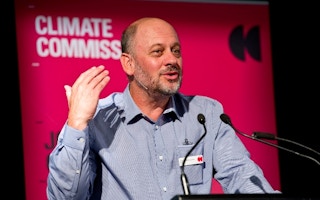The new Abbott Government decided today, just one day into governing, to axe the Climate Commission. This decision demonstrates to the Australian public the government is not interested in talking to them about climate change science or climate change action.
I was recently in a taxi on the way to give a talk about communicating about climate science, when I decided to ask the driver if he believed in climate science. “Oh no,” he said, giving me a horrified stare. “I don’t get into politics.”
Climate science has become increasingly politicised over the past five to ten years. People are no longer engaging with the science, but rather engaging or dis-engaging with the politics of the issue. This creates a public controversy, despite almost no scientific controversy.
The Climate Commission was set up to provide all Australians with an independent and reliable source of information about the science of climate change, the economics of carbon pricing, and the international action being taken to reduce carbon emissions.
Now the Commission has been axed, there is no independent body in Australia providing simple, direct explanations of the climate science. In a statement, Environment Minister Greg Hunt said “the commission’s function to provide independent advice and analysis on climate change will be continued by the Department of the Environment”.
“
The actions of Tony Abbott’s government reinforce the political nature of climate change, rather than the realities of the science. The direct impact of this will be to turn even more Australians off the science of climate change.
Climate Commission chair Professor Tim Flannery is sceptical about alternative communicators: speaking to the ABC he said he is not aware of any organisation that can do the same job as the Climate Commission – not even CSIRO or universities.
“It’s increasingly difficult for those groups to fill the role, partly because of the depth of capacity,” he said. “Many of these organisations are also constrained politically to some extent or another.”
The Commission was made up of respected experts in their various fields. Tim Flannery is not a climate scientist but is terrific at explaining the science. Professor Will Steffen is a peer-reviewed climate science expert of international repute. Professor Veena Sahajwalla is a materials scientist leading research teams who invent solutions to climate problems. Professor Lesley Hughes is a worldwide expert on the impacts of climate change on species and ecosystems. Gerry Hueston is a prominent businessman and ex-President of BP Australasia. Roger Beale is an economist and policy expert.
Australians need people of this calibre to explain the science and economics of climate change, especially when the debate has become so politically polarised.
The new government is also drawing up legislation to scrap the carbon price, axe the Climate Change Authority, and has ordered the $10 billion Clean Energy Finance Corporation to stop lending. They are not appointing a minister for climate change or science.
The actions of Tony Abbott’s government reinforce the political nature of climate change, rather than the realities of the science. The direct impact of this will be to turn even more Australians off the science of climate change.
This abolition of the Climate Change Commission will leave a gaping hole in communicating climate change. More resources, not fewer, should be given to an independent group like the Climate Change Commission to communicate and engage with all Australians to:
-
distil and translate the complexity of climate change science, including acknowledging and explaining any uncertainties
-
convey positive messages, based on peer-reviewed science, about what actions individuals, groups and businesses can take to mitigate or adapt to climate change
-
showcase local and regional examples of changes and actions that people or businesses can take to reduce emissions and adapt to inevitable climate change
-
engage people and businesses in open conversations about the science of climate change
-
detail simple and cheap options for people and businesses to change their behaviours to reduce emissions and / or adapt to climate change
-
support collaborations between government, industry and the community to take climate change actions.
Tony Abbott believes he has won a popular mandate to make the changes he has to Australia’s climate change policies and institutions. But in an environment where science has become so highly politicised and where public opinion is often swayed by high profile lobbyists (such as climate deniers), the government of the day has a duty to reach beyond the rhetoric.
They must look objectively at the science and create a vision that meets the needs of all Australians, including future generations.
Jenni Metcalfe is a PhD student and sessional lecturer at the Department of English, Media Studies & Art History at University of Queensland. Tom Dixon helped to research and edit this article. This post originally appeared here.










